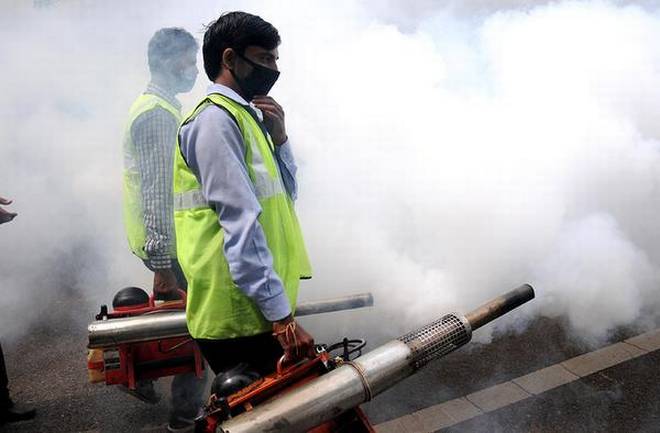Scientists decode genome of ‘miracle plant’
News Important for – General Studies – 3 I Biodiversity

Context
Scientists have decoded the genetic make-up of Arogyapacha.
About
- The Scientists from the University of Kerala have explained the genetic make-up of Arogyapacha (Trichopus zeylanicus).
- The project was undertaken by University of Kerala, Centre of Excellence in Bioinformatics at the Department of Computational Biology and Bioinformatics.
- The project will help to open up a new window to the plant’s molecular secrets.
- It is highly potent medicinal plant which is endemic to the Agasthya hills.
- This ‘miracle plant’ is known for its traditional use by the Kani tribal community to combat fatigue.
- The plant is known for its many medicinal properties
- Studies have also proved its varied spectrum of pharmacological properties such as anti-oxidant, aphrodisiac, anti-microbial, anti-inflammatory, immunomodulatory, anti-tumour, anti-ulcer, anti-hyperlipidemic, hepatoprotective and anti-diabetic.
- The manuscript has been accepted for publication in G3: Genes, Genomes and Genetics, published by the Genetics Society of America.
- The raw sequence data and genome assembly have been deposited in the US-based public database maintained by the National Centre for Biotechnology Information (NCBI).
Source Link:
https://www.thehindu.com/news/national/kerala/ku-researchers-decode-arogyapacha-genome/article28119199.ece
ILS develops antibodies against Chikungunya infection
News Important for – General Studies – 3 I Health, Biotechnology

Context
The Institute of Life Sciences (ILS) have successfully developed antibodies against the Chikungunya viral (CHIKV) infection.
About
- The antibodies will help unravel virus pathogenesis.
- The Institute of Life Sciences (ILS) will partner with a biotech company for product commercialisation and marketing of antibodies in a 60:40 profit sharing basis.
- The antibodies were developed following decade-long research on the CHIKV infection at the ILS laboratory.
- The experiment was headed by Dr. Soma Chattopadhyay, a senior molecular virologist.
|
Institute of Life Sciences (ILS) was established in the year 1989 as an autonomous institute under the administrative control of Govt. of Odisha. In 2002, it was taken over by the Department of Biotechnology, Govt. of India. The Prime Minister of India Shri Atal Bihari Vajpayee dedicated the institute to the nation in July 2003.
Institute of Life Sciences has a broad vision of carrying out high-quality multidisciplinary research in the area of life sciences. The goal is for overall development and betterment of human health, longevity, agriculture and environment.
|
Significant impact
- It will help researchers unravel myriad aspects of virus pathogenesis.
- The antibodies developed against CHIKV were receiving a tremendous response and were being purchased by research laboratories across the world
- This for the first to develop and characterize novel, highly sensitive and specific polyclonal antibodies against the non-structural proteins.
Concern
- Information on the basic mechanisms underlying CHIKV virus infection and pathogenesis.
Source Link:
https://www.thehindu.com/todays-paper/tp-national/ils-develops-antibodies-against-chikungunya-infection/article28121335.ece
MEA rejects U.S. report on state of religious freedom in India
News Important for – General Studies – 2 I International relations
Context
The Central government has rejected U.S. report on state of religious freedom in India
About
- The report, released on June 21, alleged that some senior leaders of the BJP made inflammatory speeches against minority communities.
- The report covers government policies violating religious belief and practices of groups, religious denominations and individuals, and US policies to promote religious freedom around the world.
- The report sets the backdrop of the visit of Secretary of State Mike Pompeo that begins on June 25.
India’s Stand on the report
- India states that the nation is proud of its secular credentials.
- Its status as the largest democracy and a pluralistic society with a longstanding commitment to tolerance and inclusion.
- The Indian Constitution guarantees fundamental rights to all its citizens, including its minority communities.
- India is a vibrant democracy where the Constitution provides protection of religious freedom, and where democratic governance and the rule of law
- India sees no locus standing for a foreign government to pronounce on the state of our citizens’ constitutionally protected rights.
Source Link:
https://www.thehindu.com/todays-paper/mea-rejects-american-report-on-religious-freedom-in-india/article28121449.ece
India rejects Pakistan’s charge of politicising FATF
News Important for – General Studies – 2 I International relations
Context
India on Sunday rejected Pakistan’s allegation that it had sought to “politicise” deliberations at the Financial Action Task Force (FATF).
About
- Pakistan accused India of "politicising" the deliberations for its "narrow and partisan" objectives at the FATF.
- In June 2018, the FATF decided unanimously to put Pakistan on the greylist, and hand it a 27-point action plan meant to be implemented within 18 months (by September 2019).
- Pakistan has not taken proactive role including shutting down support for groups such as the Lashkar-e-Taiba and Jaish-e-Mohammad.
- Pakistan is believed to have received the backing of China, Turkey and Malaysia to avert being put on the blacklist immediately.
- India has been publicly pushing for Pakistan to be placed on the “blacklist”, alongside Iran and North Korea for its failure to show “credible, verifiable, irreversible and sustainable measures” against terror groups operating within its territory.
- A blacklist entry for Pakistan will mean it could lose potential loans and foreign investment, be shunned by the IMF, the World Bank, the ADB and the EU.
|
The Financial Action Task Force (FATF) is an inter-governmental body established in 1989 by the Ministers of its Member jurisdictions.
The objectives of the FATF are to set standards and promote effective implementation of legal, regulatory and operational measures for combating money laundering, terrorist financing and other related threats to the integrity of the international financial system.
The FATF is therefore a “policy-making body” which works to generate the necessary political will to bring about national legislative and regulatory reforms in these areas.
The FATF has developed a series of Recommendations that are recognised as the international standard for combating of money laundering and the financing of terrorism and proliferation of weapons of mass destruction.
|
Source Link:
https://www.thehindu.com/todays-paper/tp-national/india-rejects-pakistans-charge-of-politicising-fatf/article28121363.ece
Cabinet nod for wage code Bill likely
News Important for – General Studies – 3 I Governance, Labour Reform
Context
The central is planning to approval for the Code on Wages Bill next week
About
- The Labour Ministry has drafted the law for passage in the current Parliament session.
- The bill was introduced in the Lok Sabha on August, 2017.
- It was referred to the Parliamentary Standing Committee on August 2017. The panel had submitted its report on December, 2018.
Note: The Bill lapsed after the 16th Lok Sabha was dissolved last month.
Some Important provisions of the bill
- The wage code Bill is one of four codes envisaged by the government which would subsume 44 labour laws with certain amendments.
- The four codes will deal with wages, social security, industrial safety and welfare, and industrial relations.
- The Code on Wages will replace the Payment of Wages Act, 1936, Minimum Wages Act, 1948, Payment of Bonus Act, 1965, and the Equal Remuneration Act, 1976.
Advantages of wage code Bill
- The bill provides that the central government will fix minimum wages for certain sectors, including railways and mines, while the states would be free to set minimum wages for other category of employment.
- The draft law also says that the minimum wage would be revised every five years.
- The code also provides for setting of a national minimum wage.
- The central government can set separate minimum wages for different regions or states
Source Link:
https://www.thehindu.com/todays-paper/tp-national/cabinet-nod-for-wage-code-bill-likely/article28121369.ece
Saudi launches residency scheme to boost revenue
News Important for – General Studies – 2 I International relations

Context
Saudi Arabia on Sunday launched a new special residency scheme
About
The scheme is aimed at luring wealthy expats as the petro-state seeks to boost non-oil revenue.
- The scheme will allow expats to do business without a Saudi sponsor, buy property and sponsor visas for relatives.
- The move appears to be aimed at boosting non-oil revenue as the kingdom seeks to diversify its economy.
|
Saudi Arabia is currently home to some 10 million overseas workers.
|
- The scheme offers a permanent residency for 800,000 riyals and a one-year renewable residency costing 100,000 riyals ($27,000)
- The programme will largely benefit wealthy Arabs who have lived in Saudi Arabia for years without permanent residency or MNCs seeking to do long-term business.
Source Link:
https://www.thehindu.com/news/international/saudi-launches-residency-scheme-to-boost-revenue/article28118904.ece







